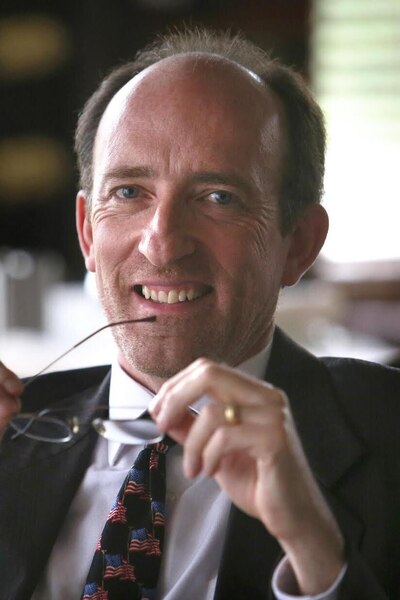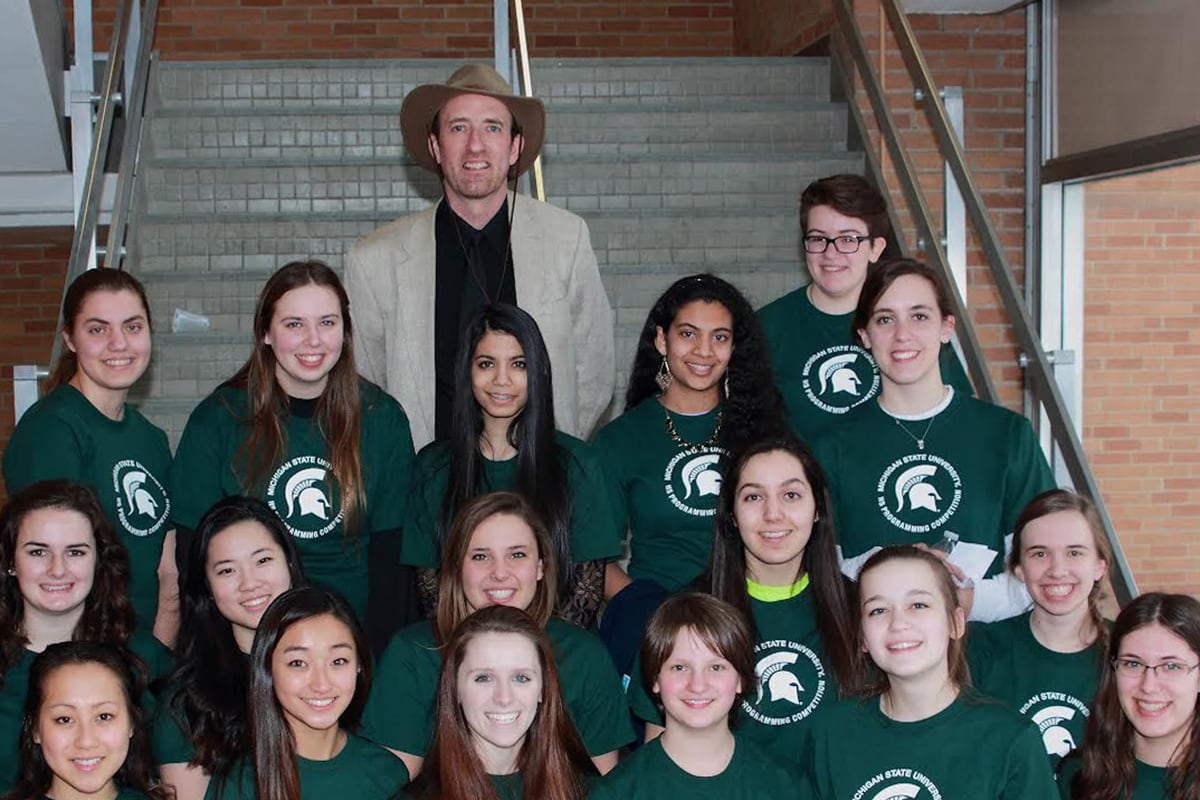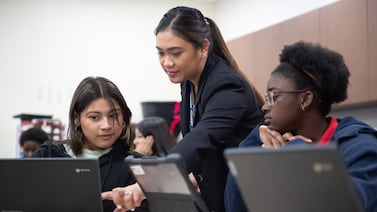Sign up for Chalkbeat’s free monthly newsletter How I Teach to get inspiration, news, and advice for — and from — educators.
Shannon Houtrouw admits he first started recruiting more girls to join his elective computer science classes out of necessity.
“When it was majority boys taking the electives, the collective maturity of the class would drop,” he said.
Having more girls in the classes helped bring focus to the lessons, according to the Kalamazoo Area Mathematics and Science Center teacher. But in the early 2010s, as recruiting more women and girls into the sciences and technology fields gained traction, Houtrouw fully realized the importance and necessity of making his classes more gender-inclusive.
“Everyone has something unique to bring to table,” he said. “When that’s not happening, we lose.”
By that time, the National Center for Women & Information Technology, or NCWIT, had been formed. Joanne McGrath Cohoon of the University of Virginia also started Tapestry workshops to teach educators how to attract more diverse students to high school computer science classes.
Having years of experience recruiting more girls into his courses, Houtrouw volunteered the strategies that worked at his school.
In 2014, the teacher decided to take only female students to Michigan State University’s high school programming contest.
“These young ladies didn’t just win the contest — they demolished their male competitors,” he said. “And then they went on to place first in the U.S. at the American Computer Science League international invitational.”

Since then, Houtrouw said dozens of his female students have been recognized by NCWIT, including six national winners. The school also has one of the highest rates of girls taking and passing the Advanced Placement Computer Science-A exam in the nation, the teacher said.
Houtrouw’s own daughters took his classes and brought home state coding titles.
“I’m glad that my kids could be a part of that,” he said.
The teacher said he wants all of his students to learn what an empowering skillset computer science is, whether or not they go into the technology field as a career path.
“Solving problems with a computer is a superpower,” he said. “You’ll be able to think critically no matter what field you go into.”
Houtrouw, who has taught coding at the same school since 1998, recently received the Presidential Award for Excellence in Mathematics and Science Teaching. He was the 2021 winner. (The recipients are announced every four years.) He recently spoke with Chalkbeat.
This interview has been edited for length and clarity.
How and when did you decide to become a teacher? What made you want to teach computer science?
I was hired by the first college I attended to work as a tutor in a lab, and as a teacher aide for a math teacher at a local high school. It was not uncommon to find me leading unofficial study groups in the dorm before big exams. But it never dawned on me to pursue teaching. I knew from high school that I loved mathematics. I didn’t know what I wanted to do for a living, but I knew math was going to be part of it.
Computer science, or CS, was a booming field back in the mid to late ’70s and early ’80s. I liked the analytical and logical nature of CS. I liked solving problems and making a computer do my bidding. I loved the relationship between mathematics and computer science. So, I decided to pursue a Bachelor of Science in CS. What I didn’t realize until much later was that I also loved trying to help my classmates figure out how to master the logic of coding.
It wasn’t until I was working for Electronic Data Systems and General Motors that I realized I was happiest when I was mentoring new employees, giving presentations, or doing things of a pedagogical nature. At that same time, I got very involved with the youth group at church back in Detroit/Southfield. I began coaching them in something called Bible Bowl. We started winning everything right from the get-go. I realized I loved working in education with young people and adults. Especially if competition is involved.
After I got married, I decided to get my first of three graduate degrees in mathematics education. My CS degree and experience opened the door for me to get a teaching assistantship. I went straight into teaching CS and math in higher education and loved it. Eventually, I landed in Kalamazoo. The Kalamazoo Area Mathematics and Science Center gave me the freedom to build a computer science program nearly from the ground up.
What’s your favorite lesson to teach and why?
I don’t know if I have a favorite lesson, but I do have a favorite activity that I like to use in all my classes. My students are all involved in our CS teams — something I have been volunteering to coach/advise since my second year at the school. From time to time, I divide the students up into trios or pairs, and I give them a few challenging programming problems to solve together during class. They look forward to this. I try to do it at least once a month in my elective courses. It’s fun, and the kids enjoy working together. We often use these activities to prepare for monthly competitions with the American Computer Science League or the USA Computing Olympiad, or to prepare for any of the high school programming contests that are hosted annually by universities in the Midwest.
Can you tell us about your experience coaching your students for coding competitions? How do the competitions help motivate their learning?
The competitions have been the driving force behind the computer science program.
I created a whole extra job for myself by volunteering to be the advisor and coach of our computer science teams. I have never received any kind of compensation for it. But infusing fun and enthusiasm into hard work, and finding ways to get the kids a lot of recognition and accolades, has been the key to motivating them to learn something hard. Sometimes I feel like Tom Sawyer getting a bunch of his friends excited about whitewashing a fence. If I can get the kids to attend a high school programming contest early in the school year, it empowers them to develop themselves.
Tell us about your own experience with school and how it affects your work today.
I ran cross country and track in high school. I learned that it really helps to meet the bigger goals you set for yourself by having a lot of smaller goals or milestones to achieve along the way. I also realized that my dedication during the off-seasons made all the difference if I wanted to develop myself into a top competitor. The same is true of computer science. If you walk into my classroom today, you would see dozens of CS Team awards on the walls and team t-shirts from nearly three decades hanging from the ceilings. The same for the hallway outside the classroom. Whatever the event, we always try to get a team photo with matching CS shirts. Getting the students recognized for their hard work provides even more motivation to keep going.
What’s the best advice you’ve ever received, and how have you put it into practice?
I have to go with President Theodore Roosevelt’s quote, “People don’t care how much you know until they know how much you care.” My wife is also a teacher-professor. She and I try to take it to the next level. We want our students to know that we love them. I know I haven’t always been the best at that, but that’s still the daily goal.
What’s one thing you’ve read that has made you a better educator?
Honestly, I have to go with the Bible on that one. Not only does it contain the teachings of the best teacher who ever lived — Jesus Christ — but it also has a strong supporting cast with the writings of Solomon, David, Moses, Daniel, Isaiah, and so many others who have shaped generations for thousands of years.
How did it feel to learn you won the presidential recognition for your teaching?
I first applied [for the Presidential Award] in 2015 and was a state finalist. I applied again in 2017 as we can only apply every other year. Finalist again. Not a winner. My colleague from Ann Arbor won the award in 2019. He is one of my best friends and someone I mentored many years ago when he first started teaching CS. So that was a vicarious victory for me. When I got state finalist in 2021, I started wondering, “Always a bridesmaid, never a bride?” Or perhaps, this is what it feels like to get a number of Academy Award nominations but never win? So it really was a huge sense of relief to get the recognition after first applying 10 years ago. It took a little while for it to sink in. I guess it really hit me when I thought about my dad. He passed away less than a year ago. I know he was proud of me, but it would have been cool if he were around long enough to see it.
Nevertheless, receiving the award at this point feels like a huge affirmation to my teaching career. The measure of success is in what we are able to accomplish with our students. But a favorable nod from the White House is really great too!
Hannah Dellinger covers K-12 education and state education policy for Chalkbeat Detroit. You can reach her at hdellinger@chalkbeat.org.







